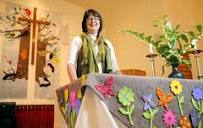 8-11-13 Prepared for the Unexpected Proverbs 31: 10-31 Here's a question for the womens. Do you ever feel like other people expect you to be "that woman?" Have you ever found yourself wanting to be like "that woman." Think for a minute about a role model you’ve found truly worthy of imitation. What are some of the qualities of that role model? When I was in my early twenties, I learned to spin (wool, silk, flax). I wasn't consciously trying to imitate the proverbial worthy woman, but who knows what my subconscious was up to? Last week in worship Rosemary Word (a role model for many United Methodist Women) shared some of the things Sarai Rice spoke about at the first Mid Maine Resource Day last spring. One of the things that has stuck with me is Sarai's emphasis on the difference between technical and adaptive approaches to problem solving. Proverbial living can be imitating techinical skills (like learning to spin). But frankly, as much as I enjoyed spinning then, its not the most useful skill in my toolbox these days. Instead, learning to focus on an unfolding process has become a resource in adaptive challenges. A technical challenge is one we can solve with available knowledge and skills. An adaptive challenge requires us to step away from our expertise and recreate. How is God calling me to live faithfully and fruitfully as this woman did then? Do I want to be remembered for having learned how to spin or for learning how to balance generously taking care of my own family and sisters and brothers in Christ as well as those in need in my community? We have plenty of problems to solve. Cna you thik of a few: In our world? In our church? In our own lives? We live in an environment that encourages us to prepare for the worst. But we read scripture and believe a God who leads us to prepare for the best. What do we really, in our hearts, expect? Because that is what we are prepared for. Sarah Rice: Every organization is perfectly aligned to achieve the results it currently gets. You only need to change if you want other results. The clamor for change Is exhausting, we hear it everywhere. IN fact, I'm thinking of striking the word "change" from my vocabulary as a spritual discipline for the next year. What and where are some of the chnages you notice most? If only someone would come and fix it! We need heoric rescue! We see this in political struggles, We see it in the religious trap of charismatic leaders who fall under the weigh of expectations they themselves build up and cannot sustain. How did Jesus, the most charismatic human being who ever lived, spirit filled, avoid this trap? The Apostle Paul wrote to early Christians struggling with issues incredibly similar to ours, "The church is Christ's body in which he speaks and acts, by which he fills everything with his presence.” -Ephesians 1:23 (The Message) The wise woman of Proverb 31 is an image of God; hers is a life of creativity, resourcefulness, compassion, strength. Raymond van Leeuwen describes her work, “to transform a Judean highland plot (as large as 10 acres) into a vineyard is a difficult, massive undertaking. It is done on rocky, hilly ground, not good for much else.” (p. 261 NIB vol. ) Reminds me of Elijah’s “dry bones” vision. Can these bones live? Can they dance? Her capacity and her will are formed in the image of the God to whom she is oriented. To meet her is to encounter a centered person. She is prepared for whatever comes, expected, or more importantly, unexpected as God does a new thing. To be honest, most of us want the change that we can expect and control. Nothing is more frightening than being out of control. This week Jeff and I tried out some of the rides at the Topsham fair. (Not the ones that you go upsaide down on). I like my thrill rides at the Topsham fair, but only with strict safety features in place. I was thinking about this morning when I received a message from Kayla McClurg about what Jesus tells us in this mornings’ gospel lesson. “Do not be afraid, little flock….” Simply sell all that you own. Relinquish everything, and give. Fear attaches to things we cannot release, a ruinous mold spreading in the dark isolation of our grasping and clutching. Fear infiltrates all the systems of our life, alters our breathing and shows up masked as various anxieties and dis-eases. Fear erodes the realm God wants to give us. In his teachings, Jesus shines a healing light upon our minds and hearts to clear the mold of fear away. Now, fear is a great motivator. There’s nothing like a good panic to get the energy flowing. But after a while it’s exhausting. Remember that old proverb about the carrot or the stick? Both are external motivators. God wants to get IN us. To create and sustain great Christians Sarai Rice reminded us in May that the purpose of the congregation is To create and sustain great Christians How do we do that here and now. How do we BECOME that great church? Part of what's disorienting about the change all Western culture churches are experiencing is that: •Things we know how to do don’t seem as important anymore and •We don’t know how to do the things that do seem to be important So we seek techinical fixes that we can handle: •Problems for which people have the know-how and procedures to solve them •Where the solution involves applying current knowledge •and the problem-solvers are the “authorities” We resist Adaptive Change: •Problems that can’t be solved with authoritative expertise and SOP •that require experimenting, new discoveries, adjustments, changed attitudes, values, and behavior •and where we cannot see at the beginning that the new situation will be better, only that there is a potential for loss •Every organization is perfectly aligned to achieve the results it currently gets. You only need to change if you want other results Sarai Rice continues: •Adaptation occurs through experimentation and relies on the presence of diversity •The most common cause of failure is when we treat adaptive challenges as if they need technical fixes •Adaptive change is not primarily about managing change; it is about managing loss In the Body of Christ, we are meant to support each other as we cultivate Christlike qualities. This is our purpose. Great churches create great Christians. We are not called to sit and wait for rescue. That's just spinning our wheels. It is not a matter of figuring out who will do for us but how will be this healthy Body together, with God’s help. Jesus never separates hearing from doing. You don't feed a family by reading cook books. You actually have to enter a kitchen, pick up some utensils, and start cooking. A disciple puts into daily practice what is heard and read. - Leonard Sweet
0 Comments
 Kings 17: 8-24 Luke 7: 11-17 These incredibly similar stories of two widows, two sons brought back from the grave, and two miracle workers both have happy endings. And that’s what makes them such dangerous texts if we use them to pull God into our stories instead of letting God pull us into the depth and width of the divine story. Loosing a child is a mother’s worst nightmare. Man of us have come close to that edge, or gone over. I can remember with a melting in my bones, the afternoon our oldest lay limp in my arms, the little chest heaving for every thin breathe of air. It only takes a moment’s imagination to be back at the side of friends whose children were gone in the flash of a moment, a knife, a car’s bumper, a gun. What do we do with these miracle stories that raise our hopes? What do we make of them when we know the child doesn’t always get up off the bed? Was it something we did or didn’t do? The Sidonite woman cries out to Elijah, "What have you against me, O man of God? You have come to me to bring my sin to remembrance, and to cause the death of my son!" Do you think it was her fault? ….a sin tax to be paid? ….failure to protect her child? Our children’s vulnerability cuts through every illusion we have that wealth, knowledge, good behavior, ritual or any other human power is in control of life itself. When Jesus met that grieving mother, she was surrounded by neighbors caught up in mourning. I think of some of the things we hear at funerals or read on social media in the face of loss. “Only the good die young.” “God took her to be an angel.” “Its all part of God’s plan.” Friends, as much as we feel compelled to explain the pain, these are not words of comfort. They are bad theology (god-talk). The singer sings: With or without you With or without you I can't live with or without you. How do we live with a God who would leave only the “bad” living on earth, who would pluck a cherished child out of a family to populate heaven’s chorus, who would plan such profound grief? But how can we live without God our creator, redeemer and sustainer when words strip comfort away? Years ago we watched a beautiful young woman in our church in Hampton Virginia battle cancer. Over the month and years of treatment, remission, in moments of normalcy, as prosthesis replaced her nose, as she fell in love, introduced her beloved to Jesus, and married, she shared her powerful encounters with Christ. They were so powerful couldn’t believe it when she died. If anyone should have had a miracle, it was she! God turns these stories around. These widows’ stories are not life giving because they promise the longed for happy ending is within our grasp. If they contained the whole of God’s message, too many of us would be left wrestling with how to live with or without the God we long for. These stories are life giving because God turns them around and face life in a way we didn’t see coming. God becomes the parent losing the child. God doesn’t just relieve our grief. God doesn’t just accompany us in our unrelieved grief. God becomes the parent who loses a child. God walks right into the fragility of our lives and does not jump back out of our story when loss looms. God walks right through the death of God’s son and out the other side to life beyond our imagining. I won’t pretend to understand the Resurrection. (If anyone ever tries to explain this extraordinary mystery to you, take it with a grain of salt!). The singer makes as much sense of it as I can hold. And you give yourself away And you give yourself away And you give, and you give And you give yourself away. With or without you I can't live with or without you. Our stories are too small, each alone or even all together, to contain God’s story. But the God who gives and receives life makes us sacred characters in a story much richer than our own introductions and conclusions. In it, we are called, "beloved." And perhaps in the end that’s all we really need to know or say. |
Karen L MunsonUnited Methodist Pastor & Liturgical Artist Archives
September 2015
Categories
All
|

 RSS Feed
RSS Feed